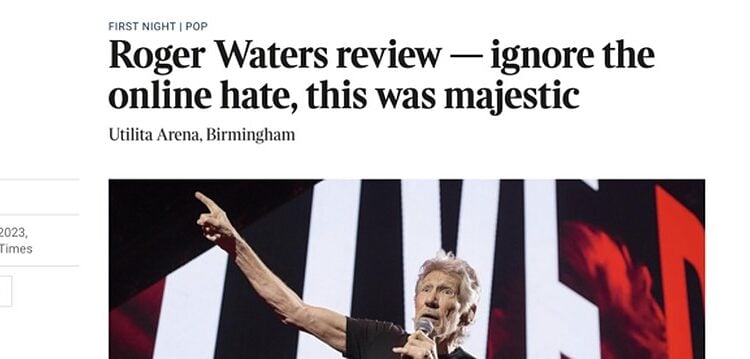Standard practice in journalism is to tell readers when an article has been amended or corrected — whatever the reason.
By Rachel O’Donoghue, Honest Reporting
The Times of London craftily edited its recent review of Roger Waters’ concert in Birmingham after the piece appeared to excuse the musician’s antisemitism.
The piece — written by music critic Mark Beaumont — was published on June 1 and caught the attention of HonestReporting over Beaumont’s thinly-disguised attempt to whitewash Waters’ long and well-documented history of antisemitism.
However, it can be revealed that the original version of the review was even more problematic and was swiftly and sneakily amended by editors at The Times to remove elements that seemingly dismissed the accusations of anti-Jewish hatred against the former Pink Floyd rocker.
The initial headline of the piece, “Roger Waters review — ignore the online hate, this was majestic,” was changed to “Roger Waters review — if you can ignore the rants, this was majestic.”
The original headline and its meaning were clear: people should “ignore” the antisemitism allegations leveled at Waters because they are spurious and the criticism he has faced is nothing more than a concocted “online hate” frenzy.
A later amendment radically altered its meaning — readers are told that Waters frequently rants in an unhinged fashion and that only “if” they can ignore such diatribes, will they enjoy the show.
And this is not the only stealthy edit made.
The first two paragraphs of the piece were also subtly changed to remove Beaumont’s obvious attempt at sanitizing Waters.
In the original version, no reference was made to Waters’ so-called “Pink paranoia” when he suggested that his critics are being directed “from Tel Aviv.” Instead, the comment stood alone and uncontextualized, suggesting the writer believes Israel really is manipulating the coverage of Waters’ tour.
Additionally, the amended article included adjectives like “raving” and “alarming’ to describe Waters’ incessant fixation with Jews and Israel, as well as removing Beaumont’s obvious insinuation that social media users are unfairly victimizing Waters (“Blame Twitter for the lurch towards condemnation over context”).

Standard practice in journalism is to tell readers when an article has been amended or corrected — whatever the reason.
Normally, an article that has been edited after publication will include a time-stamped footnote at the top or bottom of the page that states the piece was altered, although not necessarily revealing the specific change.
The Times’ failure to do this is perhaps indicative of the newspaper wishing to cover up the fact that it initially published a piece that attempted to rationalize and ultimately defend Roger Waters and his dangerous antisemitism.




